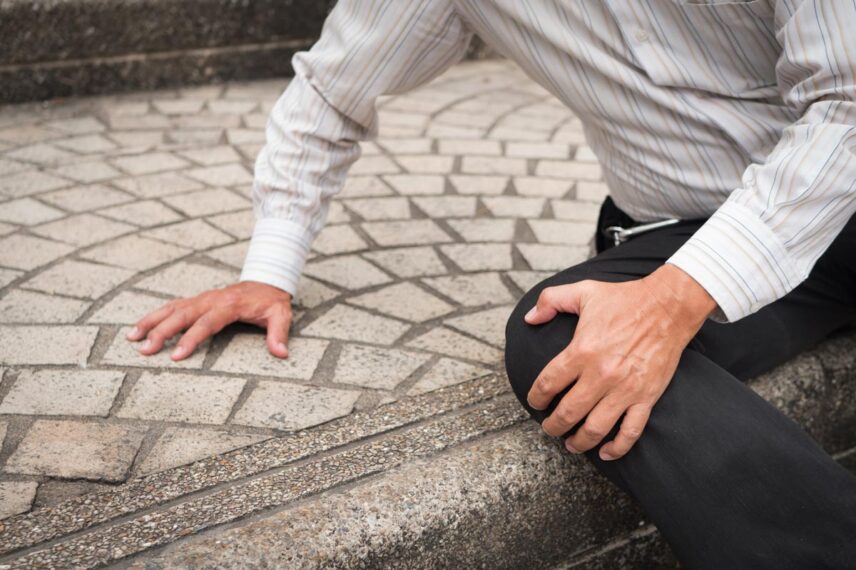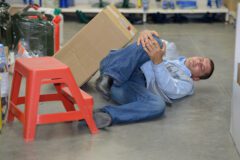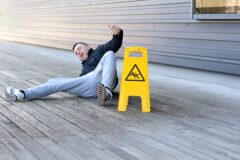Who is Responsible for Your Slip-and-Fall Accident?

A slip-and-fall accident occurs when a person “slips” and “falls” on someone else’s property due to their failure to maintain their property in a safe fashion. This negligence can be a reasonable cause to file a lawsuit against the property owner. A slip-and-fall case, otherwise referred to in the legal world as a premises liability case, is filed when the victim sustains some type of injury for which they wish to receive financial compensation.
The challenge in most slip-and-fall cases is establishing that the property owner is, in fact, responsible for the accident. Below, we’re tackling how to determine who is liable for your slip-and-fall accident and what elements you must prove to establish that the responsible party acted negligently.
Proving Liability in a Slip-and-Fall Claim
In a slip-and-fall case, the burden of proof is on the plaintiff to prove that the defendant acted in a negligent way. Negligence refers to a person’s failure to establish a suitable level of standard care. In South Carolina, you must prove three specific aspects of negligence, including:
- The property owner owed you a duty of care to protect you from harm
- The property owner breached their duty of care
- Your injury was the result of the property owner’s breach of duty
The success of your case will be determined by what the judge or jury deems to be the duty owed to you by the property manager. Additionally, in South Carolina, the duty of care the property owner owes you depends on what classification of visitor you were on their property at the time of your fall. These categories include:
Invitee
An invitee is someone who has been invited onto the premises by the property owner, such as a customer. They are owed the highest level of care, including finding, warning, and fixing invitees about any dangerous conditions on their property.
Licensee
A licensee is a person who has received permission from the property owner to visit the premises for their own enjoyment or curiosity (such as a social guest). Licensees are owed a duty of reasonable care, meaning the property owner must warn them of any concealed or known dangerous conditions.
Trespasser
A trespasser does not have permission to be on the owner’s property, thus, the property owner does not owe them a duty of care, except for abstaining from purposefully injuring them.
Who is Liable for Slip-and-Fall Accidents that Occur at Work?
While property owners are responsible for slip-and-fall accidents that occur to customers and guests, the same does not apply to employees who are injured in the workplace. When an employee has a slip-and-fall accident, they are covered by worker’s compensation. So, instead of filing a personal injury claim, the injured party must file a workers’ compensation claim.
In South Carolina, employers who have four or more employees at their place of work must, by law, provide workers’ compensation insurance. In a workers’ compensation claim, unlike a slip-and-fall lawsuit, you don’t need to prove the accident was anyone’s fault. Instead, you must show that:
- Your employer provides workers’ compensation
- Your injury happened during your employment
- Workers’ compensation covers your injury
Additionally, South Carolina has a modified comparative fault rule, which states that if the plaintiff is 50% or more at fault for their accident, they will not be allowed to recover any damages for their claim.
What Damages Am I Able to Receive Compensation for?
In a personal injury lawsuit, you may be awarded financial compensation for three types of damages. These include:
Economic Damages
These are the financial losses caused as a direct result of the accident, such as medical bills, lost wages, and property damage.
Non-Economic Damages
Include all non-monetary losses caused by the injury, like emotional distress or pain and suffering.
Punitive Damages
A type of award that is given as a way to punish the defendant and prevent others from doing similar acts.
What to Do if You’ve Been Hurt in a Slip-and-Fall Accident
Immediately following a slip-and-fall accident, it’s essential to seek medical treatment for your wounds. Next, be sure to file an official accident report with the property manager to ensure there’s a record of your accident and gather any evidence or eyewitness testimony that’s available.
Finally, call a lawyer. An experienced personal injury attorney will ensure you take all the necessary steps to file a successful premises liability claim. A skilled attorney will carefully evaluate your case and fight for the maximum settlement you deserve.






